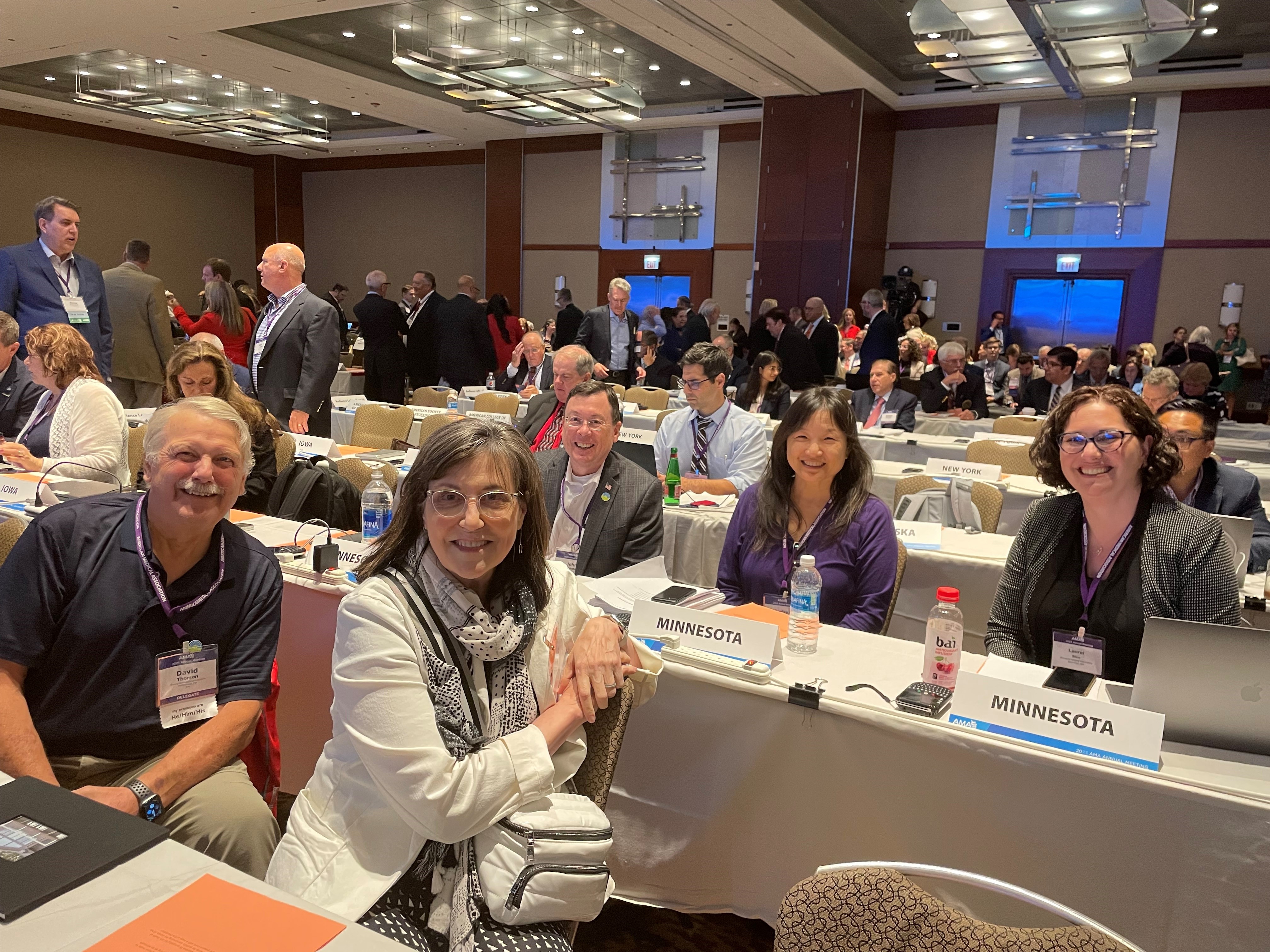Legislative Session Starts; MMA to Focus on 5 Major Issues
February 19, 2026
State lawmakers returned to St. Paul on February 17 for the second half of the 2025-2026 biennium.
June 15, 2023
At this week’s AMA Annual Meeting in Chicago, Minnesota’s delegation at the House of Delegates (HOD) submitted resolutions on supervised injection facilities, the creation of an ICD code for patients presenting with conditions related to racism; and revising the U.S. Standard Certificate of Death. All three were favorably received.
Members of the Minnesota delegation included: Cindy Firkins Smith, MD; John Abenstein, MD; Andrea Hillerud, MD; George Morris, MD; Will Nicholson, MD; Dave Thorson, MD; Laurel Ries, MD; Ashok Patel, MD; and medical student Adrina Kocharian.
Minnesota’s first resolution called on the AMA to support additional steps to allow the use of supervised injection facilities. The AMA reaffirmed its existing policy in support of supervised injection facilities.
 |
| Part of Minnesota's AMA delegation: Dave Thorson, MD (left); Cindy Firkins Smith, MD; John Abenstein, MD; Andrea Hillerud, MD; and Laurel Ries; MD. |
The second resolution called on the AMA to advocate for the creation of an ICD code for patients presenting with conditions related to experiencing racism, including systemic racism and unconscious bias. This will provide physicians with a tool to document the clinical impact of racism within the clinical encounter. There was strong support for better data, yet concerns were raised whether current codes are already sufficient to accomplish this goal. The resolution was referred to the AMA Board for a final decision.
The third resolution asked the AMA to work to change the U.S. Standard Certificate of Death to add a check box to capture deaths while in custody and further categorize the custodial death using cause and manner of death and information from the “how injury occurred” section of the death certificate. This proposal, which was adopted, is intended to improve data for further research into the public health consequences of negative police interactions.
In addition to the Minnesota resolutions, the AMA acted on several key issues addressing the practice of medicine, including support for eliminating non-compete clauses for all physicians in clinical practice to allow greater professional mobility and to serve multiple hospitals.
The HOD also asked the AMA to reevaluate various efforts to achieve collective action and unionization efforts for physicians nationwide. This move acknowledges that the landscape has changed since the last time the AMA reviewed collective action, and burnout and other pressing challenges facing physicians require a new look.
Once again, the AMA set as its top priority the need to permanently fix the Medicare physician payment system. Temporary patches and ongoing cuts to the Medicare physician payment system have left physician practices and patient access to care at serious risk. “This cannot wait; we are past the breaking point,” said AMA President Jack Resneck Jr., MD. More details on the AMA’s campaign can be found online (FixMedicareNow.org).
Jesse M. Ehrenfeld, MD, MPH, was inaugurated as AMA president. He is a senior associate dean, tenured professor of anesthesiology and director of the “Advancing a Healthier Wisconsin Endowment” at the Medical College of Wisconsin. He has also advocated on behalf of lesbian, gay, bisexual, transgender and queer (LGBTQ+) individuals. Bruce Scott, MD, an otolaryngologist from Louisville, was voted AMA president-elect. Following a year-long term as president-elect, Scott will be installed as AMA president in June 2024.
February 19, 2026
State lawmakers returned to St. Paul on February 17 for the second half of the 2025-2026 biennium.
February 19, 2026
On the second day of the legislative session, MMA leadership was already advocating for one of its top priorities - minimizing the harm of federal changes to Medical Assistance (MA).
February 19, 2026
Legislation to prohibit the use of artificial intelligence (AI) in prior authorization requirements was heard in the House Commerce Finance and Policy Committee on February 19.